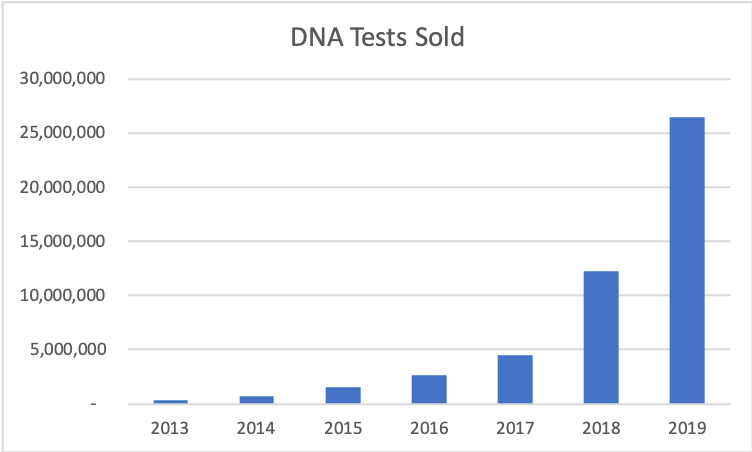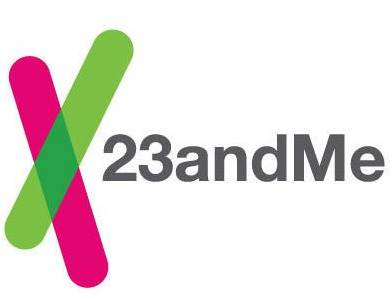3 Mistakes to Avoid When Shopping for a DNA Test
Your Free Guide to the Best Valued DNA Tests
 Looking for a good Ancestry test?
Looking for a good Ancestry test?Dear Reader,
Where are you from?
For many of us, that question can be hard to answer.
We get a different answer from mom and dad, and far more when you begin tracing grandparents, great-grandparents, and great-greats. Pretty soon you’ve got 16, 32, 64 stories to keep track of…and no way of knowing how accurate each one is.
Ancestry records can certainly help part of the way. They’re great for recent history—spotting the moment your grandfather came over on Ellis Island, or looking up the marriage records of your great-grandparents from the Old Country. But these records mostly just confirm what you already knew…
So where are you really from?
One solution is DNA testing. Its popularity has exploded in recent years, with the number of consumers signing up for testing kits more than doubling in 2019. This DNA boom has made genetic testing one of the hottest conversation starters at dinner tables and water coolers across the world.

The DNA market doubled in 2019—for the third year in a row.
It’s no surprise that DNA tests are in high demand. The things you learn from them are irresistible:
Ancestry – Everything we’ve ever known about our heritage has come from our parents and grandparents. A DNA test can tell you so much more about who you are and where you’re from. Most companies offer this basic service, but some are far better than others.
Family History – This kind of goes hand-in-hand with Ancestry. If you’re trying to sort out family mysteries, a DNA test can help you solve them. If your parents also have their DNA tested, you can sometimes sort out which genes you received from each side of the family.
Community – Finding out your genetic heritage gets you a deeper connection to the places that you’re “from.” On top of this, some of the best DNA test companies will connect you with people who share pieces of DNA with you. Many people use this feature to discover long-lost relatives.
Health Risks – Some DNA tests can reveal unique traits embedded in your genetic code that may put you at risk for certain health conditions. This can help you alter your lifestyle to try and prevent them.
Family Planning – A DNA test can help you find out what genes you may pass onto your children, for better or worse.
With so many people clamoring to get their hands on the benefits listed above, more and more DNA test companies have been rising to meet them. Unfortunately, they’re not all created equal.
Now it’s harder than ever to find a good DNA test…
Luckily, you’re in the right place. Our team of scientists, researchers, and writers at Genetics Digest know the field better than most. We’ve examined nearly every DNA test in the booming market. We’ll help you sort out the great ones from the “cheap knockoffs.”
With that said, let’s get started on Common Mistakes People Make When Shopping for a DNA Test…
Mistake #1: Don’t buy a brand by how “popular” it appears to be.
Some brands have a great marketing team with a massive advertising budget. You might see/hear their ads everywhere. That’s because they’re spending millions to make sure you’ve heard of them.
Despite the great marketing, some of those companies have subpar services at best. They’re more worried about making a sale than they are with actually delivering a quality product.
To be clear, a popular company with great marketing does NOT necessarily mean that they have a bad service. A couple of them have really great services! But you shouldn’t assume that they have a great service just because they appear to be popular, and you also shouldn’t write off lesser-known companies—some of these are new up-and-coming services who will eventually rise to the top of the market. They give you a unique opportunity to be along for the ride.
Mistake #2: Don’t buy the cheapest OR the most expensive genetic test you can find.
The old mantra “You get what you pay for” applies here. However, price is a tricky quality to navigate.
On the one hand, you don’t want something too cheap. A cheap Ancestry DNA test is most likely not the best dna test and will likely give you very little information. These tests will tell you things you already know about yourself, like which continent your genes came from. Sometimes cheap tests are simply trying to undercut the market—They may be selling at a loss up front with the hopes that customers will buy more from them later.
On the other hand, you don’t want to get ripped off by an over-priced DNA test. Expensive DNA tests may have a great product, but you can often find a product of similar (or even better) quality at a cheaper price.
You have to strike a comfortable middle ground. In our experience, roughly $100 is a fair price for a quality DNA test (give or take a few dollars). Aiming for a test around this amount will help ensure that you get a good product without over-paying.
Mistake #3: Don’t confuse “Accuracy” with “Precision.”
Almost every DNA test company on the market claims to be the “most accurate.” They’re not lying. DNA tests are typically 99.9% accurate. However, they’re often not precise.
What’s the difference between Accuracy and Precision?
For something to be “accurate,” it just needs to be true. If you have European heritage and your Ancestry DNA test comes back with results that simply say “European,” then it’s an accurate test. It’s giving you results that are true, even if they’re not detailed.
For something to be “precise,” it has to be an exact expression of details. The most precise DNA tests currently on the market have at least 20 unique regions they use in their Ancestry reports. The best companies will have multiple regions on each continent in their reports (rather than having most of their tested regions all on the same continent).
However, you have to be wary of companies overselling how precise their tests are. Some companies claim to have hundreds of regions in their reports. In our experience, this is bending the truth a bit. Most of them really test for 20-30 regions, but then list the names of countries that are contained within those regions without actually testing DNA for them.
For example, if a DNA test determines that someone has Iberian Ancestry, one of these companies might list Spain and Portugal underneath and count those as 2 “regions” for marketing purposes even though they don’t give a percentage breakdown for how much Iberian Ancestry is Spanish or Portugese.
In other words, some companies can be a little misleading with their marketing.
Our Top 3 Recommended DNA Tests
Now that we’ve shown you what to look out for, we want to share with you some of the best Ancestry DNA tests we’ve seen for discovering your heritage. .
We ranked the services by these 10 factors:
1) Company Reputation
2) Services Offered
3) Testing Method
4) Software Grade
5) Research & Scientific Evidence
6) CLIA Compliance
7) Customer Reviews
8) Price
9) Customer Service
10) Return Policy
#1 Top DNA Test: CRI Genetics
Pros:
- Patented DNA Analysis Technology
- Autosomal, mtDNA, and Y-DNA Tests Offered
- Headed by Legitimate Professional Geneticist
- “Efficiency Guarantee” Return Policy
Cons:
- Frequently Backordered
- mtDNA and Y-DNA Tests not always available
 4.7/5
4.7/5Overall Rating: Excellent
See Details
Overview:
CRI Genetics stands out as the best DNA Test for Ancestry for a few specific reasons. First, they’re headed by renowned genetic scientist with a reputation for leading exceptional studies in genetic science. While most genetic testing services rely on other people’s past research to produce their ancestry reports, CRI Genetics relies on someone who is currently doing Genome research.
Company Reputation:
CRI Genetics is led by Alexei Fedorov, Ph.D., who was mentored by Nobel Prize winning scientists at Harvard University and has gone on to spearhead many genetic studies of his own. As a company, CRI Genetics has established themselves as one of the top players in quality of service. They are the only DNA testing company we have come across that has any sort of money-back guarantee.
Details/Accuracy of Reports:
CRI Genetics currently offers 5 unique ancestry reports that are generated using a patented DNA analysis algorithm created by Alexei Fedorov. From a basic geographical breakdown of your Ancestry to a detailed history of your maternal or paternal line to an interactive “Ancestry Timeline” that pinpoints the year that certain heritages entered your family, the overall level of detail across all CRI Genetics reports is unmatched. See Full Report Here
#2 23andMe
Pros:
- Autosomal, mtDNA, and Y-DNA Tests Offered
- Many Health Reports Available
Cons:
- Some Misleading Marketing
- Limited Return Policy with Fees
Overview: 23andMe boasts one of the most detailed and accurate Ancestry Reports of all DNA testing companies. They’re #2 by a slim margin, as they have slightly fewer Ancestry & Trait reports than our #1 choice.
Company Reputation: 23andMe was founded in 2006 by Anne Wojcicki, Linda Avey, and Paul Cusenza. Their goal is to “help people access, understand, and benefit from the human genome.” To date, they have published more than 100 peer-reviewed studies in scientific journals.
Details/Accuracy of Reports: Today, 23andMe is one of the top players in the DNA testing market. Their Ancestry reports come with above average detail and accuracy, only slightly lagging behind our #1 choice. View Full Report
#3 AncestryDNA
Pros:
- Autosomal DNA Test Offered
- Very Large Database of Customers
Cons:
- No mtDNA or Y-DNA Test
- Limited Health Reports
- Very Limited Return Policy with Fees
Overview: Ancestry.com has been in business for a long time, which has allowed them to learn from mistakes and slowly acquire a large base of customers from their genealogy services. This has made them one of the top players in DNA Testing.
Company Reputation: Ancestry Publishing was founded in 1983 and eventually grew into a genealogy service, allowing customers to sort through historical records to fill out family trees. They added DNA testing to their list of services in 2007, but didn’t do it themselves until 2012.
Details/Accuracy of Reports: Ancestry DNA’s reports have 30 regions, mostly in Europe. Many customers will find this satisfactory, but our #1 and #2 choices give far more detail. Ancestry DNA’s greatest strengths lie in the size of their customer base and in their genealogy service that allows you to search through historical records to fill out your Family Tree. View Full Report
*Results may be experienced differently by different individuals. This report is developed from clinical studies, research, and customer reviews analyzed by the editors. Further supporting research and documentation can be found in the "Research" section as well as the "Disclosure" section of GeneticsDigest.
WHAT YOU WILL LEARN
✓ How DNA Tests Work
✓ Why Many Aren't Good Quality
✓ How To Select A Good DNA Test
✓ Where To Get A Great Ancestry DNA Test
About
At Genetic Digest, we’re consumers too and we want the best deals on the highest quality goods at the most reasonable prices as much as anyone else. When all of our senses are constantly bombarded with advertising at every moment of every day, it’s hard to tell which deals really are the best and which products really are high quality.


 4.3/5 Stars
4.3/5 Stars 
 3.9/5 Stars
3.9/5 Stars